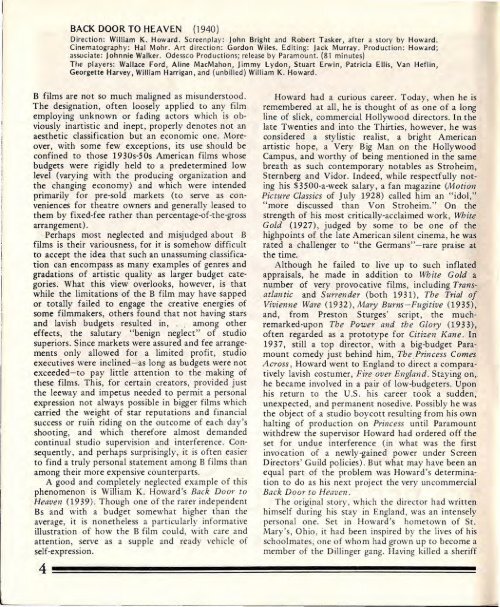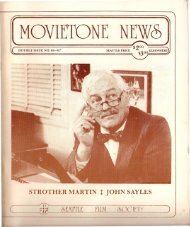MOVIETONE NEW8 . - Parallax View Annex
MOVIETONE NEW8 . - Parallax View Annex
MOVIETONE NEW8 . - Parallax View Annex
Create successful ePaper yourself
Turn your PDF publications into a flip-book with our unique Google optimized e-Paper software.
BACK DOOR TO HEAVEN (1940)<br />
Direction: William K. Howard. Screenplay: John Bright and Robert Tasker, after a story by Howard.<br />
Cinematography: Hal Mohr. Art direction: Gordon Wiles. Editing: Jack Murray. Production: Howard;<br />
associate: Johnnie Walker. Odessco Productions; release by Paramount. (81 minutes)<br />
The players: Wallace Ford, Aline MacMahon, Jimmy Lydon, Stuart Erwin, Patricia Ellis, Van Heflin,<br />
Georgette Harvey, William Harrigan, and (unbilled) William K. Howard.<br />
B films are not so much maligned as misunderstood.<br />
The designation, often loosely applied to any film<br />
employing unknown or fading actors which is obviously<br />
inartistic and inept, properly denotes not an<br />
aesthetic classification but an economic one. Moreover,<br />
with some few exceptions, its use should be<br />
confined to those 19 30s-5Os American films whose<br />
budgets were rigidly held to a predetermined low<br />
level (varying with the producing organization and<br />
the changing economy) and which were intended<br />
primarily for pre-sold markets (to serve as conveniences<br />
for theatre owners and generally leased to<br />
them by fixed-fee rather than percentage-of-the-gross<br />
arrangement).<br />
Perhaps most neglected and misjudged about B<br />
films is their variousness, for it is somehow difficult<br />
to accept the idea that such an unassuming classification<br />
can encompass as many examples of genres and<br />
gradations of artistic quality as larger budget categories.<br />
What this view overlooks, however, is that<br />
while the limitations of the B film may have sapped<br />
or totally failed to engage the creative energies of<br />
some filmmakers, others found that not having stars<br />
and lavish budgets resulted in,. among other<br />
effects, the salutary "benign neglect" of studio<br />
superiors. Since markets were assured and fee arrangements<br />
only allowed for a limited profit, studio<br />
executives were inclined-as long as budgets were not<br />
exceeded-to pay little attention to the making of<br />
these films. This, for certain creators, provided just<br />
the leeway and impetus needed to permit a personal<br />
expression not always possible in bigger films which<br />
carried the weight of star reputations and financial<br />
success or ruin riding on the outcome of each day's<br />
shooting, and which therefore almost demanded<br />
continual studio supervision and interference. Consequently,<br />
and perhaps surprisingly, it is often easier<br />
to find a truly personal statement among B films than<br />
among their more expensive counterparts.<br />
A good and completely neglected example of this<br />
phenomenon is William K. Howard's Back Door to<br />
Heaven (1939). Though one of the rarer independent<br />
Bs and with a budget somewhat higher than the<br />
average, it is nonetheless a particularly informative<br />
illustration of how the B film could, with care and<br />
attention, serve as a supple and ready vehicle of<br />
self-expression.<br />
4<br />
Howard had a curious career. Today, when he is<br />
remembered at all, he is thought of as one of a long<br />
line of slick, commercial Hollywood directors. In the<br />
late Twenties and into the Thirties, however, he was<br />
considered a stylistic realist, a bright American<br />
artistic hope, a Very Big Man on the Hollywood<br />
Campus, and worthy of being mentioned in the same<br />
breath as such contemporary notables as Stroheim,<br />
Sternberg and Vidor. Indeed, while respectfully noting<br />
his $3500-a-week salary, a fan magazine (Motion<br />
Picture Classics of July 1928) called him an "idol,"<br />
"more discussed than Von Stroheim." On the<br />
strength of his most critically-acclaimed work, White<br />
Gold (1927), judged by some to be one of the<br />
highpoints of the late American silent cinema, he was<br />
rated a challenger to "the Germans"-rare praise at<br />
the time.<br />
Although he failed to live up to such inflated<br />
appraisals, he made in addition to White Gold a<br />
number of very provocative films, including Transatlantic<br />
and Surrender (both 1931), The Trial of<br />
Vivienne Ware (1932), Mary Burns-Fugitive (1935),<br />
and, from Preston Sturges' script, the muchremarked-upon<br />
The Power and the Glory (1933),<br />
often regarded as a prototype for Citizen Kane. In<br />
1937, still a top director, with a big-budget Paramount<br />
comedy just behind him, ThePrincess Comes<br />
Across, Howard went to England to direct a comparatively<br />
lavish costumer, Fire over England. Staying on;<br />
he became involved in a pair of low-budgeters. Upon<br />
his return to the U.S. his career took a sudden,<br />
unexpected, and permanent nosedive. Possibly he was<br />
the object of a studio boycott resulting from his own<br />
halting of production on Princess until Paramount<br />
withdrew the supervisor Howard had ordered off the<br />
set for undue interference (in what was the first<br />
invocation of a newly-gained power under Screen<br />
Directors' Guild policies). But what may have been an<br />
equal part of the problem was Howard's determination<br />
to do as his next project the very uncommercial<br />
Back Door to Heaven.<br />
The original story, which the director had written<br />
himself during his stay in England, was an intensely<br />
personal one. Set in Howard's hometown of St.<br />
Mary's, Ohio, it had been inspired by the lives of his<br />
schoolmates, one of whom had grown up to become a<br />
member of the Dillinger gang. Having killed a sheriff




